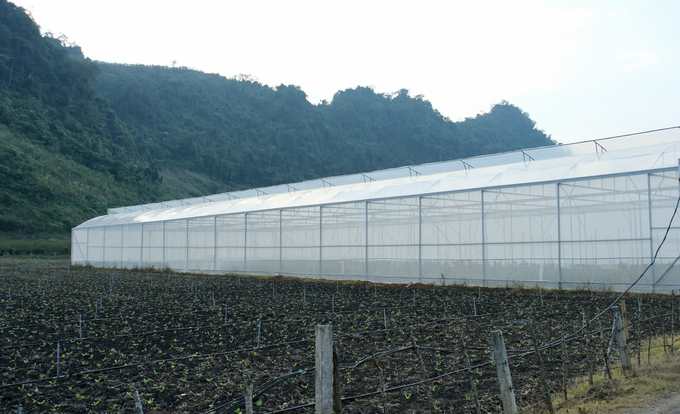November 19, 2025 | 14:21 GMT +7
November 19, 2025 | 14:21 GMT +7
Hotline: 0913.378.918
November 19, 2025 | 14:21 GMT +7
Hotline: 0913.378.918

Son La has several sub-climatic zones ideal for developing temperate fruit and vegetable production. Photo: Quynh Chi.
Located in the northern mountainous region, Son La has diverse natural conditions and multiple climate zones, making it suitable for growing both tropical and temperate crops. In areas such as Mai Son and Yen Chau, the climate supports the cultivation of tropical fruit trees like bananas, pineapples, and mangoes.
Furthermore, Son La features temperate climate zones that are ideal for growing specialized crops, particularly vegetables and fruits. A prime example is the Moc Chau Plateau, which, with its favorable soil and climate conditions, has become a hub for concentrated vegetable production. This vegetable zone not only meets local demand but also supplies major cities like Hanoi, and even other regional markets.
One of Son La's key advantages lies in its varied weather conditions. While summer in the delta provinces makes it difficult to grow temperate vegetables such as tomatoes, cabbage, and Chinese cabbage, Moc Chau in Son La can produce these crops year-round.
The development of concentrated vegetable production areas in Moc Chau not only diversifies supply sources for large markets but also significantly reduces transportation costs. Instead of transporting vegetables from Da Lat to Hanoi, Moc Chau is just about 200 kilometers away, making it a more convenient and cost-effective option. This geographical advantage positions Moc Chau as an ideal location for vegetable production, especially high-tech cultivation in greenhouses and net houses.
Moreover, establishing a concentrated vegetable production zone in Son La brings considerable benefits in reducing the import of vegetables such as carrots and potatoes from China. This strategy enhances agricultural self-sufficiency, boosts the local economy, and helps raise the profile of Son La's agricultural products on the national stage.
Translated by Quynh Chi

(VAN) Agricultural extension officers in Quang Ninh do more than transmit knowledge; they have become a steadfast support system for farmers on the path to sustainable agricultural development.

(VAN) The development of a high-quality beef cattle herd has brought major benefits to livestock farmers, creating jobs and enabling better use of agricultural by-products.

(VAN) In the eastern region of Gia Lai, crossbred cattle now account for 93%, forming a high-quality beef herd and establishing a recognized brand, the result of 35 years of persistent effort.

(VAN) Integrating agricultural extension activities with ecotourism development unlocks promising new avenues for localities boasting specific advantages in grape and apple cultivation.

(VAN) Enterprises and cooperatives accompany farmers in Tay Ninh to develop an organic seedless lime growing area, paving the way for poverty reduction.

(VAN) There were times when Pho faltered, yet his aspiration to bring the pure aroma to those who truly value clean tea kept urging him forward.

(VAN) Bich Thao Coffee Cooperative pioneered products achieving the national 5-star OCOP standard, paving the way for Son La coffee to conquer international markets.